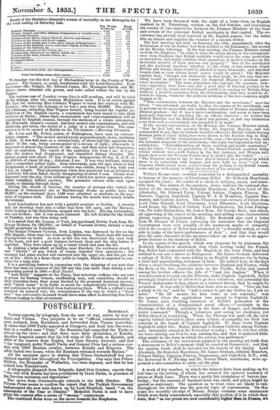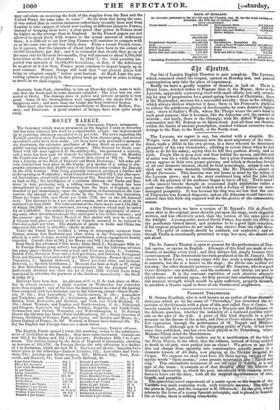A. week of dry weather, in which the farmers have
been making up for lost time in the sowing of wheat, has arrested the upward tendency of prices at Mark Lane. There was a pretty fair attendance of buyers yes- terday; but the amount of business done was small, and prices might be quoted as stationary. The question as to what, rates are likely to rule throughout the winter was the general topic of conversation. On this point the monthly circular of Messrs. Sturge contains some statements which were flatly contradicted, especially that portion of it in which they state, that " as our prices are now considmblyligher than in France, we may calculate on receiving the bulk of the supplies from the East and the United States for some time to come." So far from this being the case, it was stated that in various instances orders have recently been sent from London to take cargoes of wheat now loading at different places to France, instead of bringing them here ; a clear proof that prices in France must be higher on the average than in England. As the French papers are not allowed to speak freely with respect to the actual amount of deficiency there, it is difficult to say how long France will continue to compete with us at the same rate as she has lately done. From a recent French circu- lar it appears, that the imports of wheat lately have been to the extent of 50,000 hectolitres per day; and it is estimated that should they go on at the same rate for the next two months, they will amount to about 6,000,000 hectolitres at the end of December. In 1846-'7, the total quantity im- ported was upwards of 16,000,000 hectolitres; so that, if the deficiency be as great as it was then, France must continue to import largely up to next summer. Messrs. Sturge still hold that "our _present prices will bring an adequate supply" before next harvest. At Mark Lane the pre- vailing opinion seemed to be that prices must go upward in order to bring is much as we shall require.



























 Previous page
Previous page